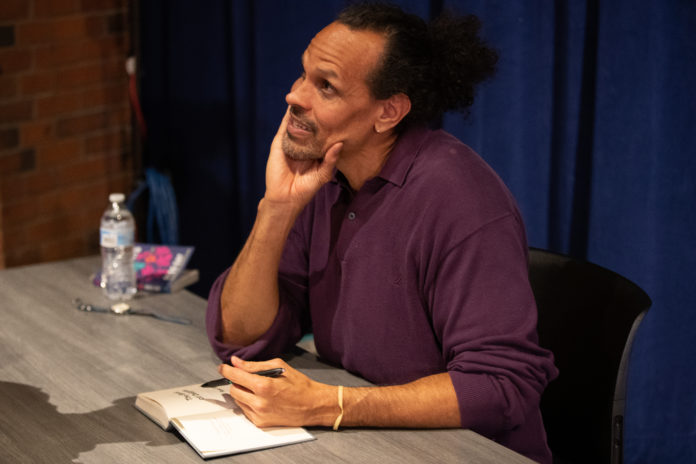Award-winning author and poet Ross Gay visited campus on Tuesday as part of an initiative for SRU’s Common Read program. Gay participated in a small Q&A, interview with RockScissorsPaper, dinner at Elephant 8 and a public talk in Miller Auditorium.
Common Read brings individuals across the country together through reading the same literary work. On campus, critical reading and several upper-level classes have incorporated the readings before. This year, however, critical writing students are included for the first time.
Julie Naviaux and Patrick McGinty, assistant professors in the Languages, Literature, Cultures and Writing Department (LLCW), were heavily involved in planning the event. Naviaux is also coordinator for the Common Read program on campus.
McGinty originally nominated Gay’s book for this year’s common read, and his “sales pitch” convinced Naviaux.
“As a teacher, I liked how Ross Gay’s writing seemed approachable in a very honest way,” Naviaux said. “I thought students could really enjoy [his style] and not feel intimidated by it.”
According to McGinty, Gay’s work has running themes “of attentiveness, of noticing”.
“For Ross, to write is to notice and to notice is to care for ourselves so that we can better care for [others],” McGinty said in his introductory speech, immediately before Ross Gay spoke Tuesday night. “His work proves that writing is a way to name what we notice so that we can better carry our experiences forward … Writing is a way to share our noticings with others.”
Gay was born in Youngstown, Ohio, and raised in Levittown, Pennsylvania. He currently teaches at Indiana University of Bloomington. Naviaux described him as a “regional author”.
“Still, now that he’s starting to get attention and fame, he’s regional,” Naviaux said. “That’s cool, to meet people who have gotten that level of recognition who are from places that you’re from.”
She is interested in having students make connections between what they learn in class and how they live outside of it. Naviaux believes meeting a bestselling author might help with this.
Both professors want to engage writing students by “demystify[ing] writing”. As a published author, when Gay speaks openly about the mistakes and revisions he makes, student writers may feel encouraged to keep going.
“Seeing inside someone else’s process is a really great benefit,” McGinty said.
Aside from Gay’s status as a well-known local author, both Naviaux and McGinty described his work as authentic. McGinty called it “small-press artistry”.
“I view him as maximizing out the artistry he can have, sentence to sentence, for the widest possible audience, which is not an easy thing to do,” McGinty said. “It’s not super common for someone who is nominally a poet to get this famous.
For a poet to be able to work in multiple genres, to be as respected in higher graduate levels or niche art circles as he is to first-year writing students … He’s really viewed as a big tent artist. All kinds are welcome.”
McGinty has enjoyed Gay’s work for years prior to the visit. In his introductory remarks, he spoke about the impact Gay’s writing had on him personally.
“It might be cheesy, but you know what, it’s true: Ross’ work changes your behavior, which changes your life, and so why not the world, too?”








